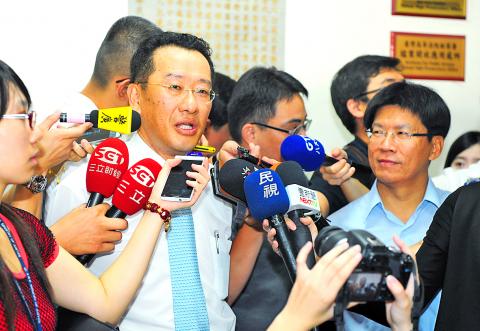Former president Lee Teng-hui (李登輝) was cleared of embezzlement charges yesterday, as the Taiwan High Court upheld a not-guilty verdict handed down by a lower court.
The Taiwan High Court said it found no evidence that Lee embezzled US$7.79 million in state funds used to conduct foreign affairs.
The Taipei District Court acquitted Lee of the charges in November last year, but the Special Investigation Division (SID) of the Supreme Prosecutors’ Office appealed the ruling to the High Court.

Photo: Lo Pei-der, Taipei Times
Lee issued a statement via his office yesterday after the verdict was announced saying he felt no particular joy over the ruling, because the SID was pursuing an old case by laying charges against him without any evidence.
“Now I hope the dust has settled and the case can be closed. The judiciary has to become truly independent, so in the future no person will be wrongly persecuted,” Lee said.
“Taiwan is now a democracy. The governing authority must not manipulate the judiciary to maintain its hold on political power. It should focus its efforts on the nation’s development,” he said.
Lee’s lawyer, Wellington Koo (顧立雄), said that “in his heart,” the former president does welcome the ruling that exonerates him and clears his name.
“Otherwise, Lee would be tainted by the charges in this late stage of his life, something he cannot accept,” Koo said.
Koo criticized the SID for reopening the case, which was closed in 2006, and then appealing the lower court’s decision to the higher court.
“Now the High Court has cleared Lee of the charges, but the damage has been done. There should be a mechanism to pursue the SID’s legal responsibility in bringing these charges,” he said.
Democratic Progressive Party (DPP) spokesman Huang Di-ying (黃帝穎) said that both the rulings proved that the SID had a political motive when it first filed charges against Lee six months before the 2012 presidential election.
“The SID was abusing its power, acting like nothing but a political henchman of [President] Ma [Ying-jeou, 馬英九] in persecuting the former president,” Huang said.
Legal experts said that as the courts had acquitted Lee, and the SID can only file an appeal with the Supreme Court if the second ruling were found to be in violation of the Constitution, the case is likely to be closed with yesterday’s ruling.
Meanwhile, yesterday’s ruling extended the prison term given to Liu Tai-ying (劉泰英), a close associate of Lee and former Chinese Nationalist Party (KMT) treasurer, to three years, from the previous two years and eight months.
The High Court said it found evidence that Liu had embezzled US$150,000 in traveler’s checks.
Liu’s lawyer, Chen Sung-tung (陳松棟), said the verdict was “unbelievable,” adding that there was no evidence that Liu embezzled state funds.
He said the verdict would be appealed to the Supreme Court.

DAREDEVIL: Honnold said it had always been a dream of his to climb Taipei 101, while a Netflix producer said the skyscraper was ‘a real icon of this country’ US climber Alex Honnold yesterday took on Taiwan’s tallest building, becoming the first person to scale Taipei 101 without a rope, harness or safety net. Hundreds of spectators gathered at the base of the 101-story skyscraper to watch Honnold, 40, embark on his daredevil feat, which was also broadcast live on Netflix. Dressed in a red T-shirt and yellow custom-made climbing shoes, Honnold swiftly moved up the southeast face of the glass and steel building. At one point, he stepped onto a platform midway up to wave down at fans and onlookers who were taking photos. People watching from inside

A Vietnamese migrant worker yesterday won NT$12 million (US$379,627) on a Lunar New Year scratch card in Kaohsiung as part of Taiwan Lottery Co’s (台灣彩券) “NT$12 Million Grand Fortune” (1200萬大吉利) game. The man was the first top-prize winner of the new game launched on Jan. 6 to mark the Lunar New Year. Three Vietnamese migrant workers visited a Taiwan Lottery shop on Xinyue Street in Kaohsiung’s Gangshan District (崗山), a store representative said. The player bought multiple tickets and, after winning nothing, held the final lottery ticket in one hand and rubbed the store’s statue of the Maitreya Buddha’s belly with the other,

‘NATO-PLUS’: ‘Our strategic partners in the Indo-Pacific are facing increasing aggression by the Chinese Communist Party,’ US Representative Rob Wittman said The US House of Representatives on Monday released its version of the Consolidated Appropriations Act, which includes US$1.15 billion to support security cooperation with Taiwan. The omnibus act, covering US$1.2 trillion of spending, allocates US$1 billion for the Taiwan Security Cooperation Initiative, as well as US$150 million for the replacement of defense articles and reimbursement of defense services provided to Taiwan. The fund allocations were based on the US National Defense Authorization Act for fiscal 2026 that was passed by the US Congress last month and authorized up to US$1 billion to the US Defense Security Cooperation Agency in support of the

HIGH-TECH DEAL: Chipmakers that expand in the US would be able to import up to 2.5 times their new capacity with no extra tariffs during an approved construction period Taiwan aims to build a “democratic” high-tech supply chain with the US and form a strategic artificial intelligence (AI) partnership under the new tariffs deal it sealed with Washington last week, Taipei’s top negotiator in the talks said yesterday. US President Donald Trump has pushed Taiwan, a major producer of semiconductors which runs a large trade surplus with the US, to invest more in the US, specifically in chips that power AI. Under the terms of the long-negotiated deal, chipmakers such as Taiwan Semiconductor Manufacturing Co (TSMC, 台積電) that expand US production would incur a lower tariff on semiconductors or related manufacturing